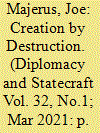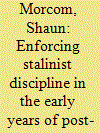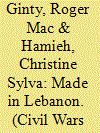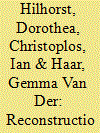| Srl | Item |
| 1 |
ID:
179018


|
|
|
|
|
| Summary/Abstract |
For several decades, the atomic bombings of Hiroshima and Nagasaki in August 1945 have been the subject of a fierce debate between orthodox and ‘revisionist’ historians. In so doing, however, historians have for the most part neglected to look more closely into questions of a primarily economic and organisational nature in investigating the contributing factors to the American decision-making process. Accordingly, this analysis explores systematically how in addition to the predominant need of avoiding further combat casualties, a speedy conclusion of the Pacific conflict was also deemed critical to a successful re-transition of United States war-time production to a thriving peace-time economy, as well as to a comprehensive rehabilitation of the war-shattered European continent.
|
|
|
|
|
|
|
|
|
|
|
|
|
|
|
|
| 2 |
ID:
144194


|
|
|
|
|
| Summary/Abstract |
A distinctive approach to disciplining the Soviet population emerged following the Terror of 1937–1938, and as a consequence of World War II, around the notion of socio-political and socio-economic ‘organisation’. The early post-war years as a consequence saw the introduction of innovative means of social disciplining in all areas of Soviet society. The infamous attack on the post-war intelligentsia, in particular, resulted from Stalin’s belief that only through the intelligentsia’s correct ‘leadership’ of this socio-economic ‘organisation’ would the Soviet Union be able to meet its challenges of reconstruction and superpower consolidation. This post-Terror and post-war phase in Stalinism marked a lasting turn, which consolidated the authoritarian socio-political dynamics evident in the later post-Stalin Soviet system.
|
|
|
|
|
|
|
|
|
|
|
|
|
|
|
|
| 3 |
ID:
096860


|
|
|
|
|
| Publication |
2010.
|
| Summary/Abstract |
Based on fieldwork and using two case studies from contemporary Lebanon, this article critically appraises indigenous responses to under-development and post-war reconstruction. Indigenous initiatives and methods have become popular among international organisations and international non-governmental organisations in development and reconstruction activities. There is a danger, however, in over-romanticising these approaches. While they hold advantages, they also hold potential risks, especially in the context of a deeply divided society. The article draws on the Waad initiative in Beirut's southern suburbs and the activities of the Future Movement in Tripoli to assess the usefulness of indigenous responses to reconstruction. After outlining the cases, four issues are discussed: the politicisation of indigenous assistance in deeply divided societies; the extent to which indigenous approaches to reconstruction can be participatory; the extent to which internationally-supported indigenous assistance can be usefully labelled as 'indigenous'; and the ability of non-state social actors to reinforce or undermine the state. Although drawing on Lebanese examples, it is hoped that the issues raised have relevance to other cases (especially in deeply divided societies) and connect with policy debates on the desirability of indigenous responses to reconstruction and development challenges.
|
|
|
|
|
|
|
|
|
|
|
|
|
|
|
|
| 4 |
ID:
100323


|
|
|
|
|
| Publication |
2010.
|
| Summary/Abstract |
This article examines an emerging approach, called 'reconstruction from below', and its growing body of practice. The article argues that interventions for post-war reconstruction increasingly espouse a commitment to be bottom-up and contextually relevant, to look beyond state institutions, and to provide space for local ownership. The article traces the emergence of this approach to six factors present in international policy. It then examines the growing body of practice in the domains of livelihoods, institution building and basic service provision. It concludes that this approach is not the magic bullet that agencies seem to expect. Reconstruction from below rests on many untested assumptions. Programmes formed pursuant to these notions are often poorly adapted to the challenges encountered and hampered by mistrust of the local institutions to which this approach rhetorically entrusts reconstruction. The large and growing body of evolving experience suggests that it is time to take stock and learn lessons about how reconstruction from below functions in practice.
|
|
|
|
|
|
|
|
|
|
|
|
|
|
|
|